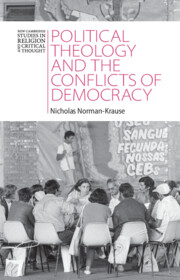Book contents
- Political Theology and the Conflicts of Democracy
- Reviews
- Series page
- Political Theology and the Conflicts of Democracy
- Copyright page
- Epigraph
- Contents
- Acknowledgments
- Introduction
- 1 Augustinianisms and Liberalisms
- 2 Radical Democracy and Agonistic Theology
- 3 Being in Conflict
- 4 Judging in Conflict
- 5 Loving in Conflict
- Epilogue
- Bibliography
- Index
Introduction
Democracy in Conflict
Published online by Cambridge University Press: 21 March 2025
- Political Theology and the Conflicts of Democracy
- Reviews
- Series page
- Political Theology and the Conflicts of Democracy
- Copyright page
- Epigraph
- Contents
- Acknowledgments
- Introduction
- 1 Augustinianisms and Liberalisms
- 2 Radical Democracy and Agonistic Theology
- 3 Being in Conflict
- 4 Judging in Conflict
- 5 Loving in Conflict
- Epilogue
- Bibliography
- Index
Summary
This introduction assesses a range of popular and scholarly attitudes toward the current state of American democracy, identifying in them a dominant theme of modern democratic theory, namely, an aversion to conflict. Just as John Rawls believed democratic societies to be perennially threatened by a “mortal conflict” between comprehensive doctrines and their “transcendent elements not admitting of compromise,” and so proposed a theory of liberal order aimed at preempting, containing, and resolving these conflicts, so contemporary critics perceive the intractable disagreements and polarizations of American political culture to be only corrosive and destabilizing. They propose strategies for achieving social cohesion grounded in a sense of national unity, shared history, or common identity more fundamental to difference. Many religious persons and traditions exhibit a similar aversion to conflict, believing it to indicate some form of sin, injustice, or moral error. I question this presumption that conflict is inherently vicious, ruinous, or violent, and begin to sketch an alternative view of conflict as basic to human creaturehood and potentially generative for social life.
Information
- Type
- Chapter
- Information
- Political Theology and the Conflicts of Democracy , pp. 1 - 34Publisher: Cambridge University PressPrint publication year: 2025
